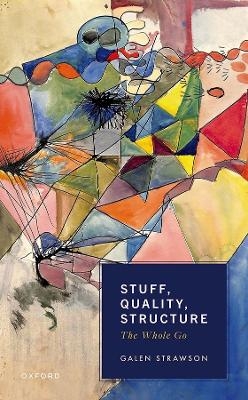
Stuff, Quality, Structure
The Whole Go
Seiten
2024
Oxford University Press (Verlag)
978-0-19-890365-9 (ISBN)
Oxford University Press (Verlag)
978-0-19-890365-9 (ISBN)
Galen Strawson argues for a comprehensive account of metaphysical categories, in defence of categorial monism, the view that there's only one fundamental metaphysical category. Stuff, Quality, Structure also provides a treatment of the notion of structure, arguing that structure cannot be fundamental.
Stuff, Quality, Structure makes a case for identity metaphysics. It defends categorial monism, the view that there's only one fundamental metaphysical category, which Strawson calls 'stuff'. It argues for the ultimate metaphysical identity of things that other views hold to be irreducibly distinct. It rejects separatism, which posits such irreducible metaphysical differences. The notions of object, process, property, state, and event seem to signal fundamental ontological differences, but these differences are superficial, according to identity metaphysics. The same goes for energy/force/laws of nature/causation/power: according to identity metaphysics, these are different ways of conceptualizing the same phenomenon, the best name for which is simply 'the nature of stuff'. More particularly: identity metaphysics opposes (1) object-property separatism and (2) stuff-law separatism. It then denies that (1) and (2) themselves are fundamentally different issues. Strawson also endorses 'stuff monism', the view that there is only one kind of fundamental stuff, and favours 'thing monism', the view that there is only one fundamental entity in reality. He then considers the place of the notion of structure in an account of concrete reality. Structure considered just as such is an abstract, wholly logico-mathematically characterizable phenomenon. If a structure is concretely realized it must be realized by something that isn't itself just a matter of structure. It is arguable, nevertheless, that a thing's structural nature may--and perhaps must--completely fix its non-structural nature in any world, or at least in any world to which the notion of structure is generally applicable.
Stuff, Quality, Structure makes a case for identity metaphysics. It defends categorial monism, the view that there's only one fundamental metaphysical category, which Strawson calls 'stuff'. It argues for the ultimate metaphysical identity of things that other views hold to be irreducibly distinct. It rejects separatism, which posits such irreducible metaphysical differences. The notions of object, process, property, state, and event seem to signal fundamental ontological differences, but these differences are superficial, according to identity metaphysics. The same goes for energy/force/laws of nature/causation/power: according to identity metaphysics, these are different ways of conceptualizing the same phenomenon, the best name for which is simply 'the nature of stuff'. More particularly: identity metaphysics opposes (1) object-property separatism and (2) stuff-law separatism. It then denies that (1) and (2) themselves are fundamentally different issues. Strawson also endorses 'stuff monism', the view that there is only one kind of fundamental stuff, and favours 'thing monism', the view that there is only one fundamental entity in reality. He then considers the place of the notion of structure in an account of concrete reality. Structure considered just as such is an abstract, wholly logico-mathematically characterizable phenomenon. If a structure is concretely realized it must be realized by something that isn't itself just a matter of structure. It is arguable, nevertheless, that a thing's structural nature may--and perhaps must--completely fix its non-structural nature in any world, or at least in any world to which the notion of structure is generally applicable.
Galen Strawson holds the President's Chair of Philosophy at the University of Texas at Austin. He is the author of Freedom and Belief (OUP, 1986, 2nd ed. 2010); The Secret Connexion: Causation, Realism, and David Hume (OUP, 1989, 2nd ed. 2014); Mental Reality (1994, 2nd ed. 2009), Selves: An Essay in Revisionary Metaphysics (OUP, 2009, revised ed. 2011); Locke on Personal Identity: Consciousness and Concernment (2011, 2nd ed. 2014); The Evident Connexion: Hume on Personal Identity (OUP, 2011, 2nd ed. 2014); and The Subject of Experience (OUP, 2017).
1: Troubles with Words
2: Identity Metaphysics: Setup
3: Real Materialism
4: A Twelve-Word Metaphysics
5: The FirstFusion
6: The Second Fusion/Fusing the Fusions
7: Stuff and Structure
| Erscheinungsdatum | 22.08.2024 |
|---|---|
| Verlagsort | Oxford |
| Sprache | englisch |
| Maße | 142 x 223 mm |
| Gewicht | 350 g |
| Themenwelt | Geisteswissenschaften ► Philosophie ► Erkenntnistheorie / Wissenschaftstheorie |
| Geisteswissenschaften ► Philosophie ► Logik | |
| Geisteswissenschaften ► Philosophie ► Metaphysik / Ontologie | |
| ISBN-10 | 0-19-890365-0 / 0198903650 |
| ISBN-13 | 978-0-19-890365-9 / 9780198903659 |
| Zustand | Neuware |
| Haben Sie eine Frage zum Produkt? |
Mehr entdecken
aus dem Bereich
aus dem Bereich
die Grundlegung der modernen Philosophie
Buch | Softcover (2023)
C.H.Beck (Verlag)
18,00 €
Buch | Softcover (2023)
Reclam, Philipp (Verlag)
7,00 €


![Was heißt Denken?. Vorlesung Wintersemester 1951/52. [Was bedeutet das alles?] - Martin Heidegger](/media/113619842)